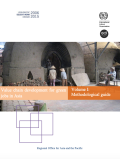The course aims to provide an in-depth understanding on various aspects related to use of energy and water. The course will specifically focus on demand- side management and energy audits as a tool to enhance the energy and water-use efficiency. It would also address the scope and opportunity in energy...
The course aims to develop an understanding of the existing and emerging renewable energy technologies, and energy conservation, and efficiency improving techniques. It covers basics of different sources and forms of energy, role of renewable energy, energy efficiency, solar thermal technology and its application along with the various aspects of...
The course aims at sensitizing participants on the issues and challenges pertaining to resource security (traditional and non-traditional) and governance including possible opportunities to address these with emphasis on sectors: minerals and metals, energy, and water. It will impart knowledge pertaining to quantitative methods for assessing resource security that will...

This interactive e-learning course aims to improve the understanding of ‘green jobs’ key concepts and definitions as part of the contribution of the world of work to sustainable development, through a review of tools, selected literature and on-going practices. Special attention is given to the approaches of the ILO Green...
The overall objective of this course is to provide a conceptual and strategic framework for the promotion of green jobs at the national level, by focusing on the social and employment dimensions of the green economy.
The Second Page Academy on the Green Economy will take place from 3 to 14 October 2016 in Turin, Italy. The Academy is organized within the framework of the Partnership for Action on Green Economy (PAGE), involing the United Nations Environment Programme (UNEP), the International Labour Organization (ILO), the United Nations Development...

This video introduces viewers to the concept of green entrepeneurship. The video acts as an online training manual, teaching entrepeneurs what green entrepeurship entails and how it can be achieved.
